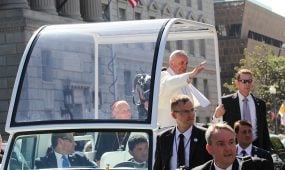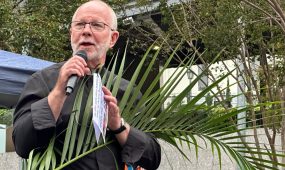Human rights through an Anglican lens
Reflections
The Archbishop of Cape Town and Primate of the Anglican Church of Southern Africa, Thabo Makgoba, gives an Anglican perspective on the recent 70th anniversary of the Universal Declaration of Human Rights

Today (10 December), we commemorate the 70th anniversary of the Universal Declaration of Human Rights, adopted in 1948 by the newly-established United Nations organisation in the aftermath of the Second World War. Some Christians sit uncomfortably with the growth of the modern human rights movement, seeing it as a “secular religion” which threatens to displace our faith, especially as Christian belief and practice declines in the countries of the Global North.
Speaking as one from the Global South, I have no such discomfort – especially coming from a country in which our faith was perverted by Christian churches to propagate the notion that separating people on the basis of race and ethnicity is necessary to peaceful human co-existence, thus denying our conviction that “There is no longer Jew or Greek, there is no longer slave or free, there is no longer male and female; for all of you are one in Christ Jesus” (Galations 3:28).
Advertisement
Let’s look at human rights through an Anglican lens, using Scripture, Tradition, Reason and Experience to interpret our context. Taking those touchstones seriously, using reason to consider our experience in the light of scripture, it seems to me that when we seek guidance from our faith on how to we should live in the world, we can begin with God’s words in Genesis: “Let us make humankind in our image” (1:26).
For if each one of us is made in God’s image, then as Desmond Tutu has said, we are God-carriers, and to treat any one of God’s children as less than this is not simply unjust, it is not simply painful for the one so treated, it is “blasphemous – like spitting in the face of God.”
Can there be an assertion any simpler and more powerful to support the statements in the first two articles of the Declaration, that “All human beings are born free and equal in dignity and rights” and “Everyone is entitled to all the rights and freedoms set forth in this Declaration, without distinction of any kind, such as race, colour, sex, language, religion, political or other opinion, national or social origin, property, birth or other status”?
Advertisement
When Jesus came, he assured us that “I came that they may have life, and have it abundantly” (John 10:10). The implication of that promise is that my faith requires me constantly to be pursuing human flourishing. It does not matter to me whether God’s children are Christians, Jews, Muslims, Hindus or Buddhists, or whether they are believers or unbelievers. It does not matter whether or not the United Nations and member governments have a vision of humanity seen through the eyes of faith. My Christian faith tells me that each person should be treated with respect and accorded the dignity they deserve because they’re made in the image of God.
That is not happening in Syria. That is not happening in South Sudan or the Democratic Republic of Congo, where hundreds of thousands of those made in God’s image have been killed or displaced from their homes in situations of instability and strife going back decades. At a meeting I joined to consider their situation recently, we were told that all those children of God born in South Sudan after 1955 could actually be called children of war.
If we are to avoid quibbling about who is promoting human rights and why, and instead boldly appropriate them and put them into scriptural language, for me the Beatitudes may be the first point of reference. As we observe Advent and prepare to celebrate the Incarnation, let each of us ask ourselves:
- What does blessedness mean in the context of what God’s children are made to suffer?
- What are the implications of God’s Word in the situations faced by our sisters and brothers who are worse off than ourselves?
- And what are the means of helping to secure peace and security, to attain equality and to achieve the Sustainable Development Goals and end material poverty by 2030?
God bless you and grant you a peaceful Advent and Christmas.
First published in Anglican Communion News Service on 10 December 2018.





